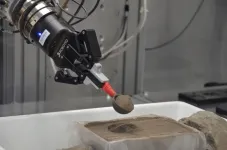(Press-News.org) While people are growing more accustomed to AI-driven personal assistants, customer service chatbots and even financial advisors, when it comes to healthcare, most still want it with a human touch.
Given that receiving healthcare is a deeply personal experience, it’s understandable that patients prefer it to come from, well, a person. But with AI’s vast potential to increase the quality, efficacy and efficiency of medicine, a push toward greater acceptance of artificial intelligence-driven medicine could unlock benefits for patients and providers.
How, then, can the industry help nudge the public to feel more comfortable with medical AI?
According to a new study from researchers at Lehigh University and Seattle University, making the concept of bias more salient in their thinking can help.
Study explores ‘bias salience’
The study, published in the journal Computers in Human Behavior, found that patients were more receptive to medical recommendations from AI when they were made more aware of the biases inherent in human healthcare decisions. This “bias salience,” or making people more conscious of bias in decision-making, was shown to shift people’s perceptions.
“This increased receptiveness to AI occurs because bias is perceived to be a fundamentally human shortcoming,” said Rebecca J. H. Wang, associate professor of marketing in the Lehigh College of Business. ”As such, when the prospect of bias is made salient, perceptions of AI integrity—defined as the perceived fairness and trustworthiness of an AI agent relative to a human counterpart—are enhanced.”
The study entailed six experiments with nearly 1,900 participants, demonstrating that when participants were reminded of human biases—such as how healthcare providers might treat patients differently based on characteristics like gender—they became more receptive to AI recommendations.
Participants were presented with scenarios in which they would be seeking a recommendation or diagnosis such as a coronary bypass or skin cancer screening. They were then asked whether they preferred the recommendation to be made by a human being or by a computer/AI assistant.
Prior to being presented with the scenario, some participants were presented with prior screens intended to increase bias salience. These interventions included reviewing an infographic that highlighted common cognitive biases, describing a time when they were negatively affected by bias, including age-related bias for those over 50, and gender-related bias. The results showed:
When participants were made aware of potential biases in human healthcare, they rated AI as offering greater "integrity," meaning they perceived it as more fair and trustworthy.
While bias salience did not eliminate people’s general preference for human healthcare, high bias salience reduces resistance to medical AI, presumably because bias is more readily associated with human beings.
In the absence of bias salience, the subjectivity of human providers is often viewed as a positive, but when bias salience is high, patients place greater value on the perceived objectivity of AI.
The future of AI in medicine
The authors stress the importance of keeping human biases in mind at all stages of AI proliferation, from development to adoption. Developers of AI systems should both aim to minimize bias inherent in the materials used to train medical AI—a known issue in the current development of AI systems—and provide context about human bias when users encounter it.
Doing so could help providers capitalize on AI’s growing role in applications such as diagnostics, treatment recommendations, and patient monitoring. Those roles are only expected to expand as the industry is projected to invest more than $30 billion into AI medicine annually by 2029.
“By addressing patients’ concerns about AI and highlighting the limitations of human judgment, healthcare providers can create a more balanced and trusting relationship between patients and emerging technologies,” Wang said.
The study was a collaboration between Wang; Lucy E. Napper, associate professor of psychology at Lehigh; Jessecae Marsh, professor of psychology and associate dean at Lehigh; and Mathew S. Isaac, professor and chair of the department of marketing at Seattle University. The paper, “To err is human: Bias salience can help overcome resistance to medical AI,” is available online.
END
New research suggests: To get patients to accept medical AI, remind them of human biases
Patients who are initially resistant to AI-driven healthcare may become more open to it after being reminded of biases in human treatment.
2024-10-16
ELSE PRESS RELEASES FROM THIS DATE:
OIST and Partisia sign MOU to advance the research and development of multi-party computation and privacy enhancing technologies
2024-10-16
The Okinawa Institute of Science and Technology (OIST) and the Danish software company Partisia have signed a Memorandum of Understanding (MOU) to strengthen their research ties.
The primary objective of this collaboration is to advance research in Multi-Party Computation (MPC), focusing on developing innovative Privacy-Enhancing Technology solutions. By leveraging their combined knowledge and expertise, OIST and Partisia aim to deliver a global perspective on secure computation, quantum-safe cryptography, and cyber security.
OIST will contribute to the collaboration with its in-house expertise and ...
Beware of the full moon: Tropical forest mammals shy away from the moonlight
2024-10-16
A recent study using automatic wildlife cameras across three continents has shed light on how the moon's phases affect the behaviour of tropical forest mammals. Half of the species studied altered their activity levels or timing, or both, in response to the full moon. The findings suggest that even in some of the darkest places on earth - the floors of tropical forests - the moon's phases can influence animal behaviour. This impact could be even more pronounced in degraded and fragmented forests.
“Imagine playing hide-and-seek in a dark room, and then somebody lights ...
Energy-thirsty indoor vertical gardens ripe for improvement
2024-10-16
Indoor vertical gardens are gaining popularity among homeowners and restaurants, allowing them to grow microgreens year-round, but new research has identified a major drawback: their demands on energy.
A study by researchers from the Marche Polytechnic University and University of South Australia shows that while domestic vertical garden appliances can provide fresh, local produce under controlled conditions and with zero food miles, they do chew up energy.
Artificial lighting – essential for plant growth – accounted for more than 50% of the total energy costs in growing a crop of red lettuce, which is five times higher than professional ...
Around 40% of postmenopausal hormone positive breast cancers linked to excess body fat
2024-10-15
Around 40% of postmenopausal hormone positive breast cancer cases may be linked to excess body fat, suggests Spanish research published online in the Journal of Epidemiology & Community Health.
This proportion is significantly higher than 1 in 10 such cases currently attributed to excess weight, using the widely used measure of body mass index (BMI), and indicates that the real impact of obesity on breast cancer risk has likely been underestimated, say the researchers.
BMI isn’t necessarily a very accurate measure of body fat, particularly in older women, because it doesn’t account for age, sex, or ethnicity, they point out.
They therefore ...
No evidence for belief that nut allergens spread through aircraft ventilation systems
2024-10-15
There is no evidence for the commonly held belief that nut allergens can be spread through aircraft ventilation systems, say allergy and aviation medicine specialists in an evidence review published in the Archives of Disease in Childhood.
Allergen residues on surfaces, such as tray tables, and seat-back video screens, pose the main risk—a risk that is likely heightened by the fast turnaround times deployed by many low-cost carriers, they suggest.
And allergic reactions to foods are around 10 to 100 times less common during flights than they are ‘on the ground,’ they point out, although this could be due to passengers with food allergies ...
First study to show high potency cannabis use leaves unique signature on DNA
2024-10-15
Published in Molecular Psychiatry, this is the first study to suggest that the use of high potency cannabis leaves a distinct mark on DNA, providing valuable insights into the biological impact of cannabis use. High potency cannabis is defined as having Delta-9-tetrahydrocannabinol (THC) content of 10 per cent or more.
The research also showed the effect of cannabis use on DNA is different in people experiencing their first episode of psychosis compared to users who have never experienced psychosis, ...
Out-of-this-world simulation key to collecting moon dust
2024-10-15
Teleoperated robots for gathering moon dust are a step closer, according to new research by scientists at the University of Bristol.
The team were able to complete a sample collection task by controlling a virtual simulation, which then sent commands to a physical robot to mirror the simulation’s actions. They were able to do so while only monitoring the simulation - without needing physical camera streams - meaning this tool could be particularly useful for delayed teleoperation on the Moon.
Alongside a boom in lunar lander missions ...
UCL engineers set new record on how fast data can be sent wirelessly
2024-10-15
A new world record in wireless transmission, promising faster and more reliable wireless communications, has been set by researchers from UCL.
The team successfully sent data over the air at a speed of 938 Gigabits per second (Gb/s) over a record frequency range of 5-150 Gigahertz (GHz).
This speed is up to 9,380 times faster than the best average 5G download speed in the UK, which is currently 100 Megabits per second (Mb/s) or over1. The total bandwidth of 145GHz is more than five times higher than the previous wireless transmission world record.
Typically, wireless networks transmit information using radio waves over ...
Isolated older people more likely to have low levels of key nutrients in their diet
2024-10-15
Older adults in the UK who are socially isolated are more likely to have an insufficient intake of key micronutrients such as vitamin C and vitamin B6, increasing their risk of health problems, according to a new study led by UCL (University College London) researchers.
The study, published in the journal Age and Ageing, looked at data from 3,713 people in the UK aged 50 and over who filled in a detailed questionnaire about what they ate and drank on two separate days.
The researchers found that people who were more socially isolated were more likely to have a lower than recommended intake of five micronutrients ...
Brazilian researchers work to transform agave into the ‘sugarcane of the sertão’
2024-10-15
Climate change has caused an increase in the semi-arid climate region in Brazil. Data from the National Center for Monitoring and Warning of Natural Disasters (CEMADEN) and the National Institute of Space Research (INPE) in the South American country indicate an expansion of 7,500 square kilometers per year since 1990, which is equivalent to five times the area of the city of São Paulo. A similar phenomenon has been observed in some regions of Europe and North Africa.
With this in mind, and with the desire to find solutions to mitigate climate change, a group ...
LAST 30 PRESS RELEASES:
New knowledge on heritability paves the way for better treatment of people with chronic inflammatory bowel disease
Under the Lens: Microbiologists Nicola Holden and Gil Domingue weigh in on the raw milk debate
Science reveals why you can’t resist a snack – even when you’re full
Kidney cancer study finds belzutifan plus pembrolizumab post-surgery helps patients at high risk for relapse stay cancer-free longer
Alkali cation effects in electrochemical carbon dioxide reduction
Test platforms for charging wireless cars now fit on a bench
$3 million NIH grant funds national study of Medicare Advantage’s benefit expansion into social supports
Amplified Sciences achieves CAP accreditation for cutting-edge diagnostic lab
Fred Hutch announces 12 recipients of the annual Harold M. Weintraub Graduate Student Award
Native forest litter helps rebuild soil life in post-mining landscapes
Mountain soils in arid regions may emit more greenhouse gas as climate shifts, new study finds
Pairing biochar with other soil amendments could unlock stronger gains in soil health
Why do we get a skip in our step when we’re happy? Thank dopamine
UC Irvine scientists uncover cellular mechanism behind muscle repair
Platform to map living brain noninvasively takes next big step
Stress-testing the Cascadia Subduction Zone reveals variability that could impact how earthquakes spread
We may be underestimating the true carbon cost of northern wildfires
Blood test predicts which bladder cancer patients may safely skip surgery
Kennesaw State's Vijay Anand honored as National Academy of Inventors Senior Member
Recovery from whaling reveals the role of age in Humpback reproduction
Can the canny tick help prevent disease like MS and cancer?
Newcomer children show lower rates of emergency department use for non‑urgent conditions, study finds
Cognitive and neuropsychiatric function in former American football players
From trash to climate tech: rubber gloves find new life as carbon capturers materials
A step towards needed treatments for hantaviruses in new molecular map
Boys are more motivated, while girls are more compassionate?
Study identifies opposing roles for IL6 and IL6R in long-term mortality
AI accurately spots medical disorder from privacy-conscious hand images
Transient Pauli blocking for broadband ultrafast optical switching
Political polarization can spur CO2 emissions, stymie climate action
[Press-News.org] New research suggests: To get patients to accept medical AI, remind them of human biasesPatients who are initially resistant to AI-driven healthcare may become more open to it after being reminded of biases in human treatment.


